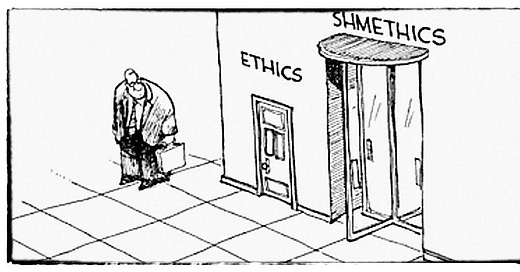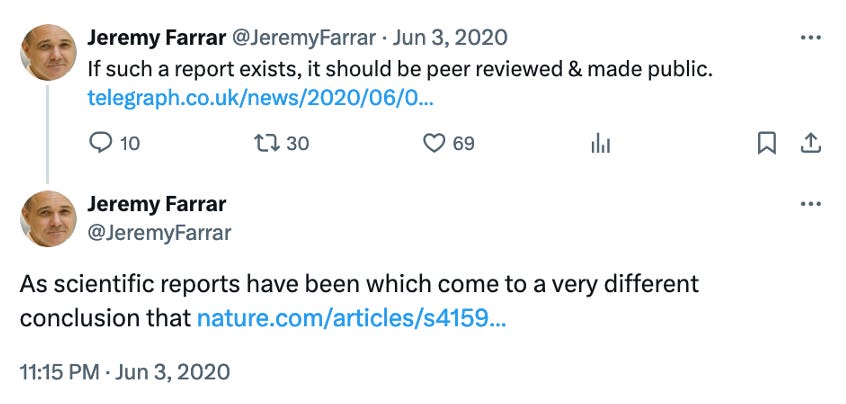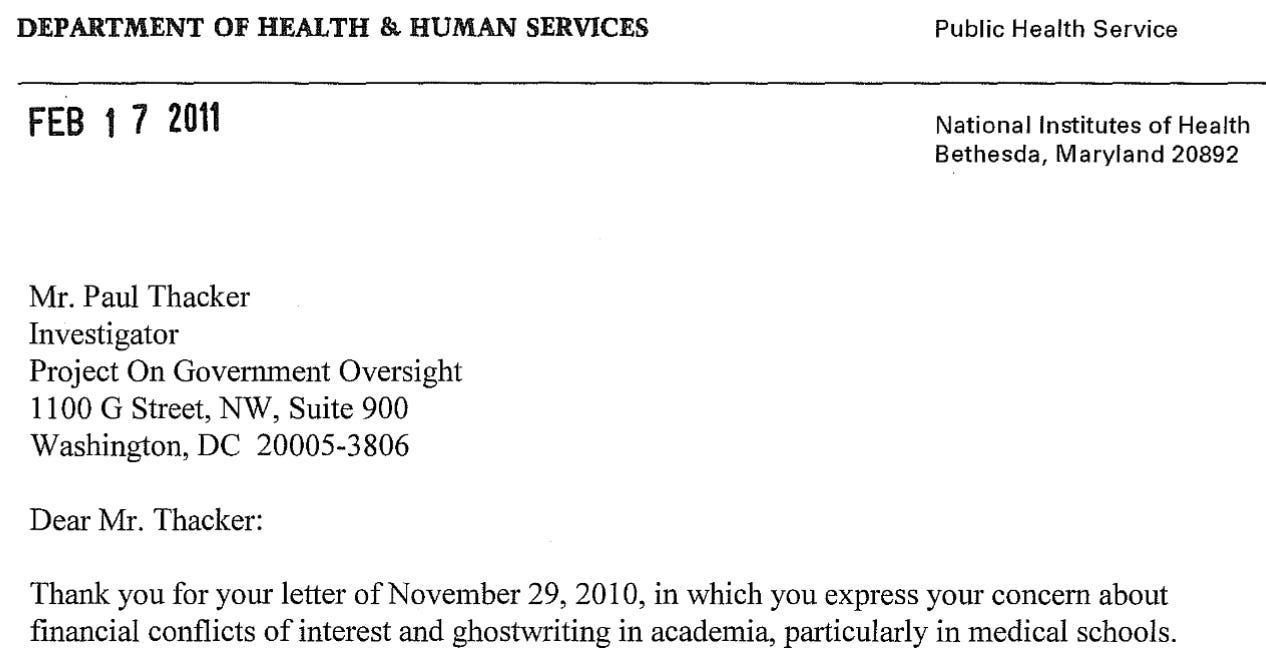Top Medical Journals Promoting Ethics Ignore Nature Medicine’s Unethical Ghostwritten COVID Origins Paper
But what's a little corruption among professionals?
5 minute read
Medical journals continue to ignore evidence that one of their own members of the International Committee of Journal Editors (ICMJE) refuses to investigate calls to retract an unethical Nature Medicine paper that Members of Congress have reported is ghostwritten by funders, after congressional investigators examined emails and deposed authors. Editors at multiple journals that help promote ICMJE’s ethical standards did not respond to emails regarding Nature Medicine’s unscrupulous behavior.
“I understand that you have contacted individual members of ICMJE and I am responding on behalf of ICMJE collectively to your inquiry below,” emailed ICMJE Secretary Christina C. Wee, an associate professor of medicine at Harvard’s Beth Israel Deaconess Medical Center. “ICMJE is a small volunteer committee of medical journal editors and while we publish what we consider to be best practices, we do not have any oversight or enforcement authority and do not comment or offer advice on specific cases.”
When asked if ICMJE will allow Nature Medicine to remain an ICMJE member while violating ICMJE's own standards on authorship, Dr. Wee refused to respond.
Nature Medicine published the “Proximal Origins” paper on March 17, 2020. Since that time, emails became public which show that lead author Kristian Andersen passed drafts and a final version of the paper past two of the paper’s funders: Jeremy Farrar at the Wellcome Trust, and Anthony Fauci at the NIH.
“Thank you again for your advice and leadership,” Andersen emailed Fauci, a week before Nature Medicine published the paper. “We’re still waiting for the proofs, so please let me know if you have any comments, suggestions, or questions about the paper or press release.”
While House Republicans argue that Tony Fauci secretly influenced the paper, House Democrats released a report that found Wellcome Trust’s Jeremy Farrar helped “organize and facilitate” the paper and “led the drafting process of the paper.”
According to Nature’s editorial policy, “A specific role for the funder in the conceptualization, design, data collection, analysis, decision to publish, or preparation of the manuscript, should be disclosed.”
“Jeremy, Dr. Farrar has been an amazing leader,” wrote “Proximal Origins” co-author Robert Garry in an email released by House Democrats. “Should be author.”
Neither Collins, Fauci, nor Farrar appear as authors or are mentioned in the paper’s acknowledgement section, and all three later cited the Nature Medicine paper as independent scientific evidence that a lab accident did not start the pandemic. For example, after The Telegraph reported that the former head of MI6 said the pandemic began with a lab accident, Farrar tweeted the Nature Medicine “Proximal Origins” paper as a scientific report that has come to “a very different conclusion.”
In a 2011, NIH Director Francis Collins wrote me and explained that when a scientist takes another person’s ideas without providing credit, that may meet the federal definition for plagiarism to be assessed by the Office of Research Integrity for research misconduct. “For example, a case of ghostwriting involving NIH-funded researchers may be appropriate for consideration as a case of plagiarism; i.e. the appropriation of another person’s idea, processes, results, or words without giving appropriate credit.”
That same year, Nature published a letter by professor Xavier Bosch at the University of Barcelona, who pointed out that a Danish scientific integrity law treats misappropriation of authorship as research misconduct. The BMJ and COPE later released a consensus statement on research misconduct that defined the term as including “authorship malpractice such as guest or ghost authorship.”
The group BioSafety Now wrote an open letter to Nature Medicine, signed by over 50 scientists, demanding the retraction of the “Proximal Origins” paper. In their letter, the researchers cited an investigation published by The Nation that reported on internal emails by the “Proximal Origins” authors that showed they didn’t even believe what they wrote in the paper.
“The main issue is that accidental release is in fact highly likely,” lead author Kristian Andersen wrote in a message to the other authors some weeks before Nature Medicine published the paper.
BioSafety Now then started an online campaign that has garnered over 5,400 signatures petitioning Nature Medicine to retract the paper.
Despite emails, public news accounts, congressional reports, and an open letter signed by over 50 scientists, Nature Medicine has done nothing to examine this matter to comply with ICMJE’s standards of conduct.
Editors contacted for this story but who refused to comment include:
BMJ’s Kamran Abassi, Bulletin of the World Health Organization’s Laragh Gollogly, Deutsches Ärzteblatt’s Christopher Baethge, Ethiopian Journal of Health Sciences’ Abraham Haileamlak, JAMA’s Kirsten Bibbins, La Tunisie Médicale’s Lilia Zakhama, NEJM’s Eric Rubin, New Zealand Medical Journal’s Frank Frizelle, Journal of Korean Medical Science’s Jong-Min Kim, PLOS’s Till Winfried Bärnighausen, The Lancet’s Richard Horton, the U.S. National Library of Medicine’s Stephen Sherry, and the World Association of Medical Editors’ Jose Florencio Lapeña, Jr.
As former NIH Director Collins explained in 2011, “The NIH believes that ghostwriting should be addressed when scientific articles citing extramural Federal funding are submitted to journals for publication.”








Perhaps we can borrow Jeremy Farrar’s burner phone (which he bragged about using during the pandemic in his book “Spike”) so we can ring the NIH’s chief bioethicist for comment. Who is she married to again? I forget. Oh well, at least these scoundrels aren’t promoted.
https://www.who.int/news/item/13-12-2022-world-health-organization-names-sir-jeremy-farrar-as-chief-scientist-dr-amelia-latu-afuhaamango-tuipulotu-as-chief-nursing-officer
Excellent article. Appreciate all the links showing the evidence. Appreciate your persistence, professionalism and integrity. Giving all of these scientists an opportunity to respond to the most basic ethical scientific standard (crediting the actual author) and their continued silence stains their profession even further. What are they thinking? Do they really think this will go away if they bury their heads in the sand?
Personally, I feel sorry for them. The torment they invite on themselves will be in direct proportion of the lies they continue to sustain. May God have mercy on each of us as we find the path to peace.